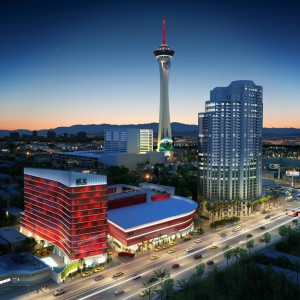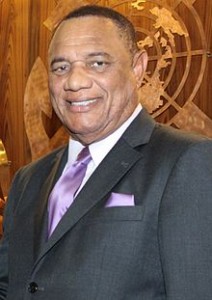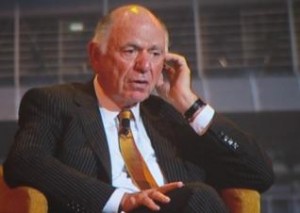By this point, it’s hardly news that Lucky Dragon Casino is on track to open in December, breathing some additional life into the north Strip (we hope). However, Lucky Dragon  execs continue to argue that they should have received tax-increment financing, a public subsidy that no other Las Vegas casino has requested in over 20 years. The pitch failed with the City Council, which voted it down overwhelmingly. “After all, it’s a legal business, it’s not something you should discriminate against,” argued the lone dissenter, Bob Coffin. Lucky Dragon COO David Jacoby went farther, arguing for a sweeping implementation of TIF: “Other states and cities have used TIF for casino properties, and it’s worked out well for them. It seems to me that we should support our largest industry here, which is casinos, with the same sort of assistance other states have been providing the gaming industry.” Ah yes, but those cities and states have much smaller gaming industries, too. If cities and counties in Nevada were to start underwriting the omnipresent casino industry, the toll on the public purse would be great indeed.
execs continue to argue that they should have received tax-increment financing, a public subsidy that no other Las Vegas casino has requested in over 20 years. The pitch failed with the City Council, which voted it down overwhelmingly. “After all, it’s a legal business, it’s not something you should discriminate against,” argued the lone dissenter, Bob Coffin. Lucky Dragon COO David Jacoby went farther, arguing for a sweeping implementation of TIF: “Other states and cities have used TIF for casino properties, and it’s worked out well for them. It seems to me that we should support our largest industry here, which is casinos, with the same sort of assistance other states have been providing the gaming industry.” Ah yes, but those cities and states have much smaller gaming industries, too. If cities and counties in Nevada were to start underwriting the omnipresent casino industry, the toll on the public purse would be great indeed.
* The Gordian Knot otherwise known as the Baha Mar megaresort has been cut and the solution seems to please almost no one except Bahamas Prime Minister Perry Christie. The unfinished project will be placed under the stewardship of the Export-Import Bank of China and completed by China State Construction Engineering Corp., whose workmanship was faulted by some for Baha Mar’s breakdown. Under the  terms of Christie’s pact, China State Construction would get first dibs on ownership of Baha Mar when it emerges from receivership. Also, domestic creditors owed $74 million were left out in the cold. Said one contractor, “I don’t know why [Christie’s] position would be to promote CCA finishing the project when they didn’t do it the first time … Some people do stupid things, but that would be beyond stupid. I can’t imagine them not including this in the negotiations,” he added of the defaulted obligations.
terms of Christie’s pact, China State Construction would get first dibs on ownership of Baha Mar when it emerges from receivership. Also, domestic creditors owed $74 million were left out in the cold. Said one contractor, “I don’t know why [Christie’s] position would be to promote CCA finishing the project when they didn’t do it the first time … Some people do stupid things, but that would be beyond stupid. I can’t imagine them not including this in the negotiations,” he added of the defaulted obligations.
Christie political rival K.P. Turnquest said, “Don’t give away the house for the sake of one roof.” His sentiments were seconded in a petition signed by 2,000 displaced Baha Mar workers, who wrote, “We already have proof that at [China Construction America] projects, there are less jobs for Bahamians. Less Bahamians at work mean more Chinese at work.” And ousted Baha Mar developer Sarkis Izmirlian issued a lengthy statement that concluded, “There is nothing in CCA’s past performance at Baha Mar that should lend confidence that they can complete Baha Mar on any schedule they provide and refrain from re-engaging in deceitful business practices, including overbilling and substituting inferior materials and systems to the detriment of the potential of this resort.”
Among the allegations made against the deal is that it gives GCA an exclusive, 30-year license for the casino. Interestingly, it is an accusation that Christie did not deny.
* Casino operators in Macao should “not panic,” says former Las Vegas Sands COO Michael Leven. He urges them to stand pat on room rates, saying they “should continue to make sure they really watch their rate structures and not let happen in Macao what happened in Vegas in 2008 and 2009. All the hotels there dropped their rates so  significantly, that they’ve had a tough time recovering.” ADRs in Macao are already down 17.5% from last year. This is occurring against the backdrop of a dilution in the market, as new rooms come onto the market by the tens of thousands. Leven advised “the fine properties in Macao – such as the ones that are being built and some of the very good older ones – should continue to make sure they really watch their rate structures.” As for the decline in players from the mainland and Hong Kong, Leven advised trying to replace them but was chary with specifics.
significantly, that they’ve had a tough time recovering.” ADRs in Macao are already down 17.5% from last year. This is occurring against the backdrop of a dilution in the market, as new rooms come onto the market by the tens of thousands. Leven advised “the fine properties in Macao – such as the ones that are being built and some of the very good older ones – should continue to make sure they really watch their rate structures.” As for the decline in players from the mainland and Hong Kong, Leven advised trying to replace them but was chary with specifics.
Leven’s only regret was not targeting the mass market sooner, adding, “the diversification of the Macao market – to have things other than just gaming – will help to bring in more foreign tourists to Macao. But there’s no question it’s going to take some time, and the next couple of years will be tough.” He praised the soon-to-open Parisian as “a very unique product” that will be a “dramatic success.” As for the long-running lawsuit between Sands and former Sands China CEO Steven Jacobs, who Leven had praised for saving the company, the ex-exec now says, “He failed in … handling his relationships with individuals in the property [Venetian Macao], in handling his relationships with his peers, in handling his relationships with the government. Those were serious deficiencies. But I wouldn’t take away what he accomplished before that.”
Meanwhile, in a Sino-fication of the casino industry, the Chinese government is making it harder for foreign casino executives to obtain visas. The goal of the policy shift is to open up more managerial vacancies for Chinese and Macanese nationals. According to a Sanford C. Bernstein analysis, “well over 80 percent of manager-and-above positions, 77 percent of all workers at the casino properties, and 96 percent of casino-specific employees” are Macanese. U.S.-based casino operators may well get their concessions renewed but should probably look forward to a future when their properties are American in little more than ownership (maybe not even that, as they sit on government-owned land).

